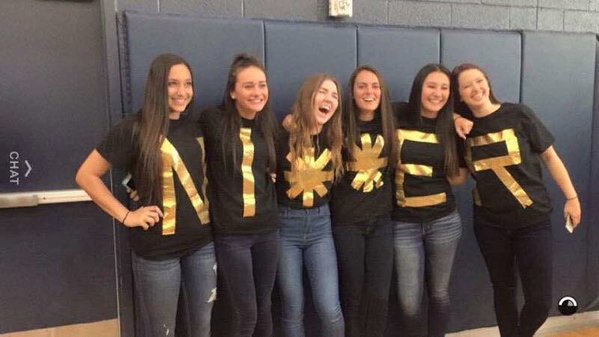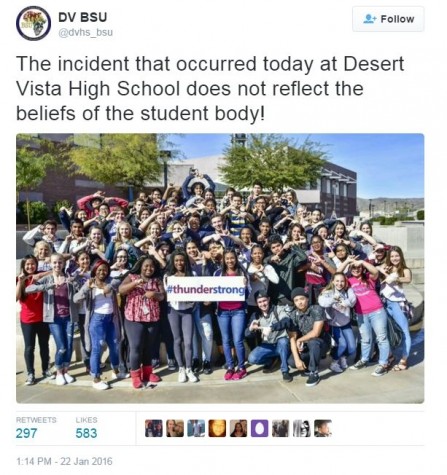The N-Word and How Not to Use It

Girls from Desert Vista High School posing for a picture while spelling out a racial slur with their shirts
February 8, 2016
Twitter erupted into a wave of outrage following the discovery of a controversial picture.
In late January, a picture showing six high school students proudly displaying a troubling slur made its way into the depths of the interweb. The students stand side by side, locked in an embrace, wearing lettered shirts that together spell out the letters N I * * E R
Following the events at the school, the Desert Vista High School Black Student Union quickly responded that the image portrayed by the girls do not represent the views or opinion of the DVHS student body as a whole.

Tweet from the Black Student Union in response to the incident
According to Nathan Wellman of usuncut.com, the Tempe Union High School District reportedly responded with “outrage” upon discovery of the incident, and expressed that they had taken “swift disciplinary action.” However, the punishment given to the girls itself ignited further rage, when it was revealed that they only served a five-day suspension, a cost many viewed as far too cheap.
One of the girls later issued a public apology, insisting in fact that she is “not a racist” and holds “love for everyone” in her heart. The photo was supposedly originally taken for the boyfriend of one of the girls in the picture, who is black.
The fact that the incident took place in a high school demonstrates that racism can occur anywhere–including places like AVHS. Are racial tensions present here?
As many students know, there is a hallway in our school that is often referred to as “Africa,” supposedly due to a large population of African-American students that gather there.
“I do not like that term,” said AVHS Administrative Assistant Paul Tinder, “and I know there are students that find it offensive as well. When they refer to that area of the hallway as being [Africa], they’re looking at who’s there, and how can they judge them based on what they look like.”
“When I first came to AVHS… and someone told me about ‘Africa,’ to be quite honest I was surprised and shocked,” said AVHS sophomore Mia Holmes.
“We have cases [of racial tension] that pop up,” said Tinder. “I’ve dealt with one and Mr Bolsoni’s dealt with one, but what I deal with, versus what actually happens out there, are two very different things, as there as things that people do not report for fear of how others may view them, or possibly from fear of retaliation.”
AVHS senior Aby Tesfaye, while admitting having heard rumors, says, “I’ve heard students say that they think certain teachers are racist and have been unfair to them, but I’ve never personally witnessed or experienced it at AVHS.”
While being undeniably controversial, the picture also raises the question: Are people simply overreacting to the word, with the connotation it once had being a thing of the past, or is the reaction justified, with people of color standing up against oppression?
Holmes said she “wasn’t shocked at all” when she saw that picture. “Things like this happen all the time and they happen because white people think it’s okay and it is not at all.”
Tesfaye supports that claim: “Millions fought to become free of that word, and if you truly don’t understand the meaning, then it shouldn’t be said.”
In an interview given to tolerance.org, Neal A. Lester, dean of humanities and former chair of the English department at Arizona State University, explains the origins of the N-word. It originally started as just another word for a black person, a “negro.” However, “[w]e know that as early as the 17th century,‘negro’ evolved to ‘nigger’ as intentionally derogatory, and it has never been able to shed that baggage since then; the word is inextricably linked with violence and brutality on black psyches and derogatory aspersions cast on black bodies. No degree of appropriating can rid it of that bloodsoaked history.”
Nowadays, it is not uncommon for African-American students to use the word as a form of endearment to other people of color, which may lead to some to believe that the word may be used freely regardless of the race of the person saying it. The First Amendment, which guarantees the freedom of speech, is often cited in such an argument.
“The First Amendment shouldn’t be an excuse to degrade someone,” said 2015 AVHS graduate Noah Grant. “I think it’s true that we have free speech [but] it is still a word that represents a negative history, and it is still hurtful. I think it’s okay to tell a white person they can’t say it, or any other non-black for that matter, but as a white person I’m in no place to tell a black person not to use it.”
“The difference is the White man was the oppressor and the Black man was the one oppressed,” said Holmes. “The difference is that calling another person a ‘nigga’ or saying ‘that’s my nigga’ is because they have gone through the same oppressive situation they have.”
“That word, for me, sparks very negative memories of the past,” said Tinder. “I’ve had my own personal experiences with that word growing up, and that is why I believe that word is a hurtful, hateful word that should not be used.”
“Historically white people used this word to demean black people, which is why it shouldn’t be uttered, ever,” said Grant. “I don’t think that black people should say it either, but I’m not going to ask them not to; it’s not a word tied to the history of my race.”
“We hardly have any history of white people being oppressed by other races,” said Tesfaye. “They [white people] have no right to use a word so lightly that they created as an insult; when a white person says it, it sounds as if they were using it to insult you or make you feel below them.”
Racism has indisputably been an issue faced in this country by people of color, and how to deal with it is also highly debated. However, some individuals, such Dr. Sharroky Hollie, who spoke to AVHS staff members on the matter, suggests a simple solution: Don’t make your first thought your last thought.
“We all walk around with our all internal biases,” said Tinder. “And whether we realize it or not, regardless of our skin tone, those biases affect how we think of people. We all have to filter, and stop to think about what we’re thinking about.”
Changing the way we think about people can be challenging, especially if those ways have been drilled into our minds for most of our lives. However, there are ways to make it right, even if it’s as simple as not saying a word.
As Mia Holmes said, “Just because you don’t add the ‘ER’ and replace it with an ‘A,’ it doesn’t make it any less offensive.”



Brennan Sammon • Feb 9, 2016 at 3:53 pm
How are we going to stop this derogatory term “nigga”? I am a white male and don’t use this word. I know plenty of African Americans who use this word, however. So if African Americans are saying it to other African Americans, why is it wrong for a white person to say “nigga” to a black person? I have tons and tons of black friends and don’t look at them any different then I do my white friends. People should all be looked at through the same lense no matter your background or personal experience you’ve been through.
Ivan Calixto • Feb 9, 2016 at 6:59 pm
Hello Brennan,
As much as I wish I had the answer to solving racism, I don’t. It’s great that you don’t use the word, I commend you for that, but I think the issue black people have with white people saying it is that it serves as a reminder of what once was. I however, am not black, so it is not my place nor right to act as a spokesperson for them. You make a point of saying that we should all view each other through the same “lense”, or to be in a sense, “colorblind”. The issue with that is that it invalidates people’s identities. A person’s experiences and backgrounds are formed in a major part due to their culture, and in turn, skin color. Saying in a sense “I don’t see color; I just see people” carries with it one huge implicatiom by implying that color is a problem to begin with, arguably synonymous with “I can see who you are despite your race.”
We cannot just ignore things like this and see everyone through the same “lense”. Instead, we should say “I recognize our differences and I respect them”.
I’ll leave you with one more quote by Mia Holmes: “I’m not saying white people can’t use it, I’m saying they shouldn’t use it and they definitely should not want to after everything that has gone down in history.”
Salman Ali • Feb 11, 2016 at 11:18 am
Hello,
To answer your question, why it is not ok for white person to call a black person ‘nigga’ one must look at the historical context of the word as well as the negative connotation that comes along with it. The N word is derived from Spanish word negro, and was later turned into the N word and became a prerogative term for African Americans to degrade and marginalized them for 245 years. Less than 70 years ago, the N word was still being used while African Americans were being murdered and maimed by white people. They were deemed social outcast, and unfit to be part of society. With that being said, as a White person you don’t reserve the right to say the N word, nor should you want to, given the historical context. Now, for as to why African Americans say it to one another varies from person to person. Some use it to ‘reclaim’ the word and change the connotation to symbolize brotherhood/sisterhood. Nevertheless, if African Americans choose to say the N word to one another, it should not have any bearing on whether white person can say it.